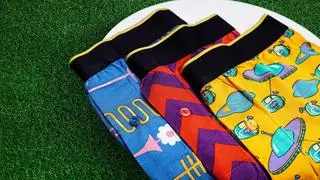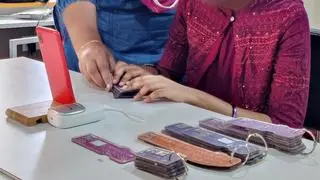Back in the 1990s when M Anbukani mooted the idea of starting a garment unit in Madurai, there were not many who gave him much of a chance. A few even tried to dissuade him from putting up the unit in Madurai. After all, their reasoning went, he would be catering to foreign customers and how many of them would have heard of Madurai. He would be better off establishing the plant in either Chennai or Bengaluru. But Anbukani, 54, Managing Director, Penguin Apparels (P) Ltd, was not to be deterred. He was convinced that the plant would come up only in Madurai. For, after all, that was were he had grown up and where his family lived. And, he wanted to give something back to the town.
Now, nearly 26 years after he established Penguin Apparels’ first unit, with about 40 sewing machines, 60 employees and a bank loan of over ₹30 lakh, Anbukani can feel proud and vindicated of his move.
The apparel business that he started is now about ₹150 crore big and boasts of some of the big global names such as Hugo Boss, Ralph Lauren, Timberland, Burberry, Ergobaby, Petit Bateau, Degre-7 and Mountain Equipment Co-op as its customers. The company now has nearly 1,800 of the latest international brand sewing machines and about 3,000 employees, nearly 98 per cent of them women from the rural areas of Madurai.
Family supportHe attributes the growth to many factors, chief among them being his family – his father A Mariappan, with nearly five decades of experience of working in a leading textile mill, now nearly 80 years old, is a guiding light; his mother Padmalosani, 74 years old, is at the first plant almost every working day dealing with workers’ welfare; his two brothers M Elango and M Elavarasan, both engineers, his cousin MR Kannan, an MCA graduate, and uncle A Annadurai, an engineer, who take care of production. His son, Manivannan, has joined the business after completing a BTech in fashion technology from Coimbatore and a Master’s in management from the UK.
Anbukani, a BBA from Thiagarajar College in Madurai and an MBA from PSG Tech in Coimbatore, worked for about six months in a manufacturing company in Coimbatore. But his heart was not on working for someone else. “I didn’t want to be a job seeker. I wanted to provide job opportunities to people,” he says, during a recent chat in his office at the Kappalur Industrial Estate in Madurai.
In the late 1980s, he says, the garment business was thriving and he was keen to enter it, breaking away from the traditional services businesses his family was into. He had to scale down his initial proposal after banks said they would find it difficult to support such a large investment from someone new to the business. Penguin Apparels started its manufacturing operations on July 1, 1991 doing job works for others. The first six months were a struggle, he recalls and remembers sleeping on the floor in the factory, as he was keen to meet the shipment deadline.
The company’s first big break came when a French agent, Denis Germain of Birdy Trading, wondered whether Penguin would be able to deliver shirts within a specific timeframe. That was in January 1992. “We shipped to that customer promptly, with good quality,” says Anbukani. And, there was no looking back. The relationship with Germain still continues.
Initially, according to Anbukani, Penguin made only men’s shirts. Now, its range is vast. It makes bottoms and shirts for boys and men; jackets; men’s and women’s skiwear; technical jackets; and, baby carriers, including those made with organic cotton, infant inserts, teething pads and nursing pillows. It will soon start making blazers.
Anbukani is particularly proud of the down jackets that Penguin makes. A down jacket is a warm jacket meant to protect the person wearing it against temperatures of minus 20-30 degrees Celsius. It is filled with soft feathers – Penguin imports duck feathers for the insulation from Austria – and the outer layer is usually made of nylon or polyester. Down is the material that provides the insulation. These jackets, says Anbukani, have nearly 350 panels. As we were going around the plant where these jackets are made, we meet Denise Piemonte of Idealp Sport of France, which makes ski wear under Duivallard brand. Denise says she is working with Penguin on designing ski wear that will go on sale in Europe in June 2018. “I am extremely pleased with Penguin,” she adds.
Thanks to Paul Boye Diffusions, a French company that Penguin was supplying garments to, it got a chance to supply army fatigues to the French army. An army team came to Penguin’s factory to check it out. Anbukani says he took this assignment as a challenge and told his team that they have to accomplish the order.
According to him, being in Madurai has not been a handicap for Penguin. Penguin, says Anbukani, has made an enormous difference to its women’s employees, all of whom come from villages in and around the plants; it has plants in three locations now – in the Kappalur industrial estate, at Karadikal village and at the Vadipatti Integrated Textile Park. The employees are from within a 25-km radius of the plants and their average take home salary will be about ₹8,000. Many of them have got married, quit their jobs and some have returned. Some have grown within the company and become supervisors, helping maintain quality and timely delivery. It is because of being in Madurai, says Anbukani, that he has been able to draw upon the support of his extended family.
Anbukani acknowledges the mentorship provided by T Kannan, Managing Director, Thiagarajar Mills, which went a long way in making Penguin what it is today. He too is keen to mentor entrepreneurs from Madurai.
The Karadikal plant, where Penguin makes baby carriers, is like an oasis in a desert. Amidst a barren landscape the plant stands out with its lush vegetation. All thanks to treated effluents and sewage which have been used to plant various varieties of trees and to grow vegetables. All Penguin’s plants have rooftop solar panels, which meet a fifth of its total energy requirements.
Expansion planPenguin now makes and ships about 200,000 pieces of garments every month. It has imported machines for sewing, cutting, embroidery and washing. In the next five years, it plans to double its business. He ships through Tuticorin port, which is three hours by road. The company sends out 15-20 containers every month.
Anbukani is confident that the company can achieve 25 per cent growth by merely upgrading its machines and improving the skills of its employees. It has recently started offering design services to its customers.
The company has ploughed back most of the money it earns into the business, because of which it has not felt the need to go in for external investment, barring the term loans and working capital requirements from banks. It has been able to compete with countries such as Bangladesh, China, Vietnam and Sri Lanka and meet customer expectations while still remaining in Madurai thanks to the investment in machinery and its employees. “If I have to invite a customer to Madurai, I have to do something special. Cost-wise there is no point in competing with others,” he says, of Penguin’s strategy.








Comments
Comments have to be in English, and in full sentences. They cannot be abusive or personal. Please abide by our community guidelines for posting your comments.
We have migrated to a new commenting platform. If you are already a registered user of TheHindu Businessline and logged in, you may continue to engage with our articles. If you do not have an account please register and login to post comments. Users can access their older comments by logging into their accounts on Vuukle.